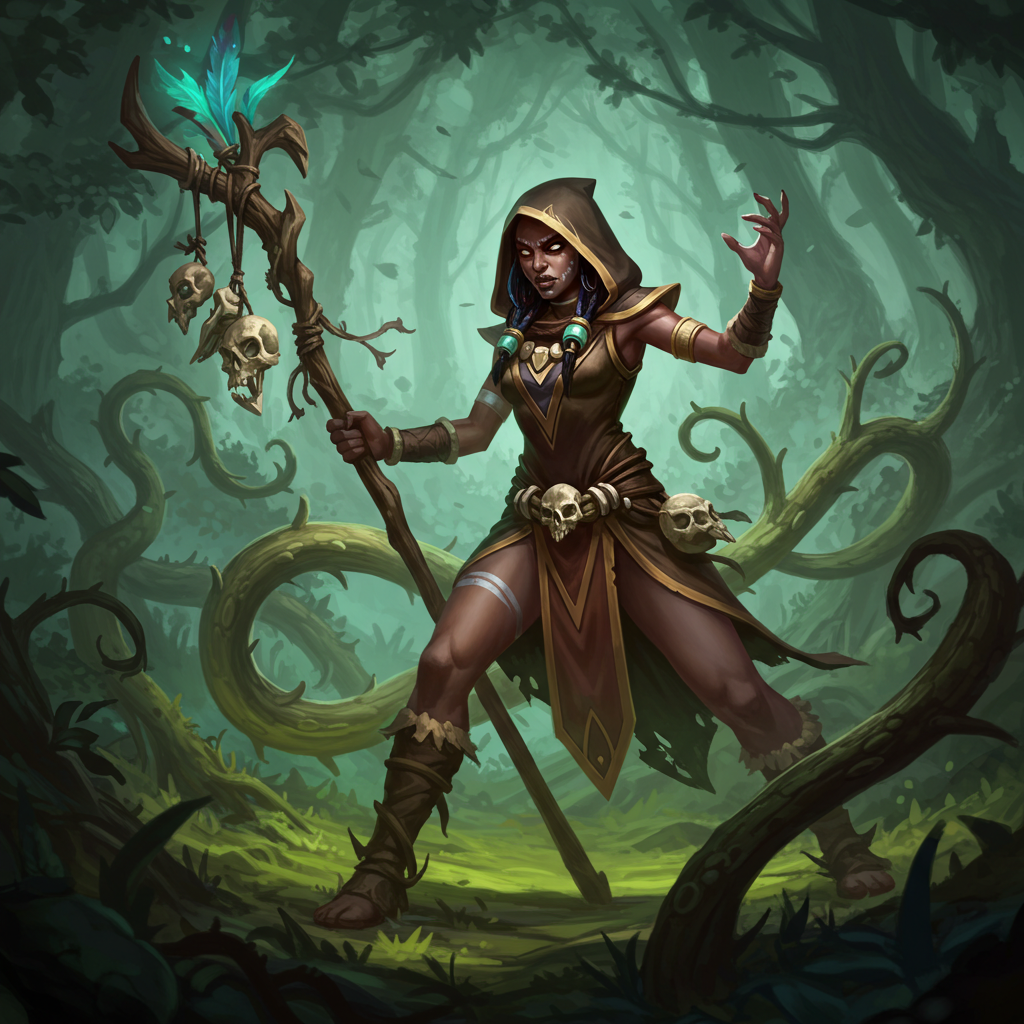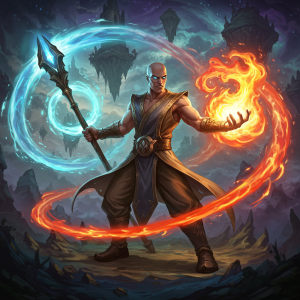The Shamans of Aetolia
Arising from the ashes of the Druidic guild within the Heartwood, the Shamans are the awakened seers of Dia'ruis that stride the ancient forests. Known amongst their people as augurs and spiritwalkers, the Shaman aim to protect the lands of Dia'ruis and enact the will of their masters: the Praadi an-Kiar and the spirits within that claim dominion over that fledgling plane. Situated beneath the whole of the Great Oak, the murmured song and rituals of the Shamans can be heard, reverberating throughout the ancient Heartwood.
Blooded in the ancient rites of Shamanism, Primality, and Naturalism, the Shamans stand as weavers of old oaths, bend nature to their will, and call upon the Rhythm itself in battle against all who would stand against them in their task. The Praadi stand as watchers of an old world and do not give quarter to those who move against them.


Shaman Skills
The energy that courses through the veins of all that lives is manifest in the art of Primality, the most direct skill in a Shaman's arsenal. By tapping into the primal energy derived from their natural magics and the bounty of gifts blessed upon them by Dendara, Primality allows the Shaman to shape powerful bursts of lightning, monumental storms of wind, and curses that drain vital forces themselves directly from their foe. Such is their connection to Nature, that they may even command nature around them to grow, lashing their foes with venomous vines and leaving their battered foe to be reclaimed by the Cycle itself.
As a Shaman communes with nature to bombard their foe, they will accrue a measure of natural energy, imbued within their person. While no primal abilities require this energy, a Shaman will find that accumulating natural energy will speed their assault, and allow them to directly boost abilities to add secondary, often dangerous effects to their strikes. Masters of Primality are even capable of quickening their own motions, allowing them to bombard a foe with empowered strikes regardless of their energy state. Directing the ebb and flow of nature through manuevering their quarterstaff, a Shaman versed in Primality is a mighty foe indeed.
Ready to play a Shaman?
Create your character and play for free today - no download required!
Roleplaying a Shaman
Born from the ashes of the Druids of old, Shamans are awakened seers of Dia'ruis, fervent priests - and often cultists - of life, death, and the ever-turning Cycle. Nature vast and eternal is their domain; they walk amongst the woodlands, sing unto the trees, commune with primordial spirits and bestride the tumultuous line betwixt joyous beginnings and sombre ends that encompasses life in all its forms.
Having toiled for centuries in the hopeless preservation of Dendara, Shamans have found renewal of their own through the birth of Dia'ruis in the Year 504, reaffirming their commitment to the Cycle in the unyielding, deadly savagery that is the wilds.
What is Dia'ruis?
Dia'ruis is a Lirathyar, a - or rather the - Plane of Life, a fledgling plane born from the efforts of Duiran in the Year 504. Its forerunner, Dendara, served as the chief focus of Duiran for countless years as it decayed, overrun and slowly dying by shadow's rapacious consumption. In a daring ritual led by Esyrtesh Sibatti Dur Naya, the Council, aided and abetted by the Hunter and the Underking, wrenched the moon from the sky, allowing Varian, the Celestine, a break from His perpetual duel with the Albedi Eschaton to trim away the healthy parts of Dendara and create a new Plane free of rot and corruption.
Thus was Dia'ruis born, and thus does life go on within this primordial land of unending dawn and eternal dusk. From this font of life come the spirits of all beasts, fauna, and fowl alike, awaiting their birth into the Cycle. At the heart of the plane stands a burgeoning World Tree, its nascent eaves stretching forth into the twilit heavens. It is a wild and untamed place, unmarred by civilisation or the tread of industry; nature in all its glory flourishes therein, from the gentle babbling of freshwater streams to the predators lurking in the dark hunting for prey.
Who are the Guardians?
Amidst the cornucopia of life inhabiting and flourishing within Dia'ruis lurk the Guardians. These primordial beings are among the most ancient of spirits, having inhabited Dendara for thousands of years and existing now within Dia'ruis. In simple terms, the Guardians represent various aspects of the wilds, from the wrathful ire of nature to the nurturing wisdom and defence of the forests.
Each Guardian is immensely powerful in their own right, and while there are more than those listed here, those chiefly known to Sapients are Takaros, a wyvern known as the Fury; Kree-sa, an immense spider known as the Broodmother; Vo'acha, a serpent known as the Shadow; Rhulvok, the bear Warden; Griash, the cougar who goes by the Keeper; and Srahda, a massive raven known as the Seer.
What is the Cycle?
The Cycle, also known as the Rhythm, refers to the cycle of Renewal created by Varian and the three Gods of the Triumvirate (Haern, Dhar, and Lleis) when much of the world was young and life existed as but a fledgling spark in the darkness. At its heart, the Cycle embodies the concept that all things must die so the new may live. It is death that nourishes the Plane of Life, allowing Dia'ruis - formerly Dendara - to continue its inexorable charge of rebirth and revivification. As such, Life and Death are of equal importance to the Cycle; the latter begets the former, and when the two are in balance, nature thrives, recycling the old to make way for the fresh.
How are the powers of the class accessed?
Communing directly with the natural world allows a Shaman to harness primal energy from their surroundings, calling on a variety of destructive and monumental powers to drain life forces, command lightning to strike with wild volatility, and more. Shamanism is a more esoteric and subtle art, derived in part from oaths sworn to the aforementioned Guardians in order to bond with spiritual manifestations of natural fauna.
This is further accentuated by tapping into the spiritual aspects of Dia'ruis in order to create fetishes, masks of bone, and bring down ill omens and doleful premonitions on those who stand against them. Finally, Naturalism taps directly into the woodlands of the world, respect and reverence for the forests begetting a slew of potent abilities while therein, including assent from the woods to establish a grove - a haven of tranquil reflection - and to expand the reach of nature's wild dominion by calling overgrowth to spread beyond the bounds.
Visual style of the class
The wrath of nature is anything but subtle and the Shamanic arts are similarly robust and noticeable. Lightning flies from their quarterstaves; the soughing of trees responds to their woven song of memory; the rattling of fetishes and tumbling bones is ever heard around them, and nature itself comes alive at their earnest command, rustling vines and gathering storms a common sight.
Ritual is an inherent component of the Shamanic way, and their elaborate workings are nothing less than mystifying - and, frequently, terrifying - to an outsider looking upon their invocations, their curses, and their chant of life and death.
Side effects of use
As seers who delve beyond the veil and into the spiritual, a Shaman's grasp on reality can become tenuous and laden with paranoia. Some begin to see omens and portents everywhere; others take to hallucinogenics in order to enhance their far sight, which carry their own side effects.
Working with lightning can leave the hands painfully burned and scarred, and becoming withdrawn, even cynical, about those outside the woods - and especially those outside the Cycle - is very common.
Roleplaying the class
The diversity of Shaman roleplay is matched only by the vastness of nature as a whole. Though at the heart a Shaman is always a guardian of nature, a protector of the wilds, and, in some ways, an extension of the will of Life and Death, two are rarely the same.
Many yet hearken to the bygone days of the Druids and opt for a peaceful life in tune with the forests, content to live as they please. Those who go to the extremes tend to be witches, seers, and fierce warriors, equally at home on the battlefield or in the dark heart of the deep thickets working terrible curses.































